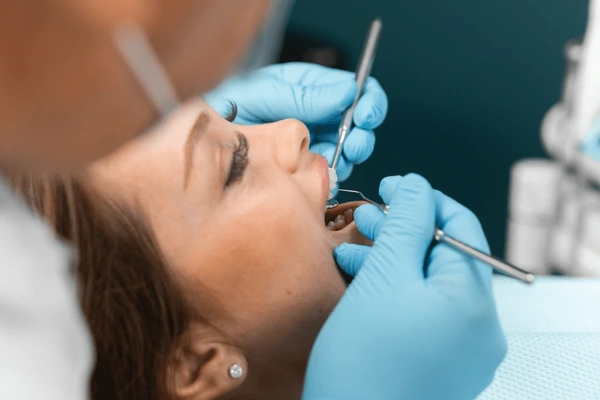Imagine a typical morning—you’re ready to start the day, maybe even feeling energized. But then, you glance at your calendar, and there it is: the dentist appointment you’ve been dreading. For some, this moment brings a sense of unease, even fear. At Pinnacle Dental Group, we understand that visiting the dentist isn’t always easy. In fact, you’re not alone if the thought of sitting in a dental chair makes you tense. Dental anxiety is more common than you might think, with many people feeling apprehensive about visiting the dentist for a variety of reasons.
We know that for some, the anxiety starts early, rooted in memories from childhood. Maybe you recall the sharp sound of dental tools or the odd sensation of being in that reclining chair as a child. For others, the fear stems from concerns about pain, discomfort, or even the uncertainty of what might happen during the visit. Whatever the reason, this anxiety can often lead to putting off appointments or avoiding dental care altogether—despite knowing how essential it is to maintain a healthy smile.
But here’s the good news: understanding why these fears occur is the first step toward overcoming them. In this article, we’ll explore the root causes of dental anxiety, unpack the psychological factors that contribute to it, and offer actionable strategies for making your next visit a calm and positive experience. Our goal is to help you feel empowered and at ease about your oral health, so you can take control of your dental care journey with confidence.
What Drives Dental Anxiety?
Many people wonder why a seemingly routine visit to Dentist Monroe can spark such deep-seated anxiety. In reality, there are several common triggers behind this fear, and understanding them can help put things into perspective.
Imagine a typical morning—you’re ready to start the day, maybe even feeling energized. But then, you glance at your calendar, and there it is: the dentist appointment you’ve been dreading. For some, this moment brings a sense of unease, even fear. At Pinnacle Dental Group, we understand that visiting the dentist isn’t always easy. In fact, you’re not alone if the thought of sitting in a dental chair makes you tense. Dental anxiety is more common than you might think, with many people feeling apprehensive about visiting the dentist for a variety of reasons.
We know that for some, the anxiety starts early, rooted in memories from childhood. Maybe you recall the sharp sound of dental tools or the odd sensation of being in that reclining chair as a child. For others, the fear stems from concerns about pain, discomfort, or even the uncertainty of what might happen during the visit. Whatever the reason, this anxiety can often lead to putting off appointments or avoiding dental care altogether—despite knowing how essential it is to maintain a healthy smile.
But here’s the good news: understanding why these fears occur is the first step toward overcoming them. In this article, we’ll explore the root causes of dental anxiety, unpack the psychological factors that contribute to it, and offer actionable strategies for making your next visit a calm and positive experience. Our goal is to help you feel empowered and at ease about your oral health, so you can take control of your dental care journey with confidence.
What Drives Dental Anxiety?
Many people wonder why a seemingly routine visit to Dentist Monroe can spark such deep-seated anxiety. In reality, there are several common triggers behind this fear, and understanding them can help put things into perspective.
Common Triggers of Dental Fear
One of the primary reasons people feel nervous about visiting the dentist is the fear of pain. Past experiences that were uncomfortable or painful can linger in our minds and lead to avoidance. The sound of dental instruments, the clinical smell of antiseptic, and the physical closeness involved in dental care can all play a role in heightening these feelings of unease.
Sensory and Physical Triggers in a Dental Setting
Dental anxiety is often rooted in sensory triggers. The sound of drills, the bright overhead light, and the specific scent of dental offices can all stir up discomfort, making it challenging to relax. These sensory triggers, even if harmless, can bring up emotions associated with past experiences and lead to fear.
The Role of Anticipatory Anxiety
For some, the fear doesn’t stem from a specific memory or even a recent experience—it’s anticipatory. Just the thought of a dental visit can provoke anxiety, creating a “what if” scenario in the mind. The anticipation of discomfort or bad news often becomes overwhelming, leading people to delay or avoid their appointments altogether.

Understanding Different Types of Dental Anxiety
Dental anxiety isn’t a one-size-fits-all experience. For some, it manifests as mild nervousness, while for others, it may develop into a more intense, even paralyzing phobia.
- Dental Fear: This is often triggered by specific aspects of a dental visit, such as the fear of needles, drills, or pain. It’s typically less intense than a full phobia but can still lead to avoidance.
- Dental Anxiety: With anxiety, the worry and nervousness can begin days before an appointment. Patients might experience physical symptoms like sweating, racing thoughts, and nausea.
- Dental Phobia: This is the most severe form, where the fear becomes so intense that people completely avoid the dentist. Dental phobia often requires professional support and specific techniques to manage and overcome.
Understanding which type of dental anxiety you’re dealing with is a critical step toward managing it effectively. At Pinnacle Dental Group, we provide a supportive environment for every level of anxiety, helping patients feel comfortable no matter what type of dental fear they experience.
The Psychological Roots of Dental Fear
When we talk about dental fear, it’s important to remember that it isn’t just a reaction to physical experiences. There’s a psychological element that plays a significant role in why people feel afraid of the dentist.
How Early Experiences Shape Dental Anxiety
Early childhood experiences at the dentist can influence how we feel about dental care as adults. Even minor discomfort during a dental procedure can have a lasting impact, creating a negative association with dental visits. This is why at Pinnacle Dental Group, we take special care with young patients to create positive, gentle experiences that make them feel safe and supported.
The Link Between Dental Anxiety and Generalized Anxiety
People who already experience generalized anxiety may be more likely to develop dental fear. The heightened sense of worry and tendency to anticipate the worst can amplify dental fears. It’s common for those with general anxiety to feel a lack of control in the dental chair, which can contribute to a feeling of vulnerability.
Social and Media Influence on Dental Fear
Pop culture and media often portray dental visits as unpleasant, with exaggerated scenes of discomfort that reinforce negative stereotypes. Seeing these portrayals over time can shape a person’s mindset, making them associate dental care with pain or discomfort—even if their real-life experiences don’t match these portrayals.
Effective Ways to Conquer Dentist Anxiety
If dental anxiety has been holding you back, it’s important to know that there are many ways to manage and even overcome it. At Pinnacle Dental Group, we are here to help you feel at ease, no matter where your anxiety stems from. Here are some effective strategies for making dental visits more comfortable and manageable.
Tips for Reducing Dental Anxiety at Home
Managing dental anxiety can begin at home, long before you ever step foot in a dental office. Techniques such as mindfulness meditation, deep breathing exercises, and visualization can help calm your mind and body. Practicing these methods regularly can reduce overall anxiety levels, making it easier to face situations that feel stressful, like a dental visit.
Choosing a Dentist Specializing in Patient Comfort
Finding a dentist who understands and prioritizes your comfort can make a world of difference. Dentists who are trained in anxiety management techniques or who offer sedation options can provide a more relaxed experience. At Pinnacle Dental Group, we’re dedicated to creating a welcoming, soothing environment, from our approach to patient care to the design of our office space.
In-Office Anxiety Solutions: Sedation, Music, and Communication
Once you’re in the dental chair, there are plenty of techniques we use to help ease your anxiety. Options like nitrous oxide (laughing gas) or oral sedation can create a sense of calm without making you feel out of control. We also encourage patients to bring their favorite music or podcasts to listen to during the visit—sometimes, focusing on familiar sounds can be a comforting distraction. And remember, open communication is key; letting us know your concerns allows us to take the steps needed to make you feel safe and comfortable.

Benefits of Regular Dental Visits for Overcoming Fear
Regular dental visits not only help keep your teeth and gums healthy but can also play a significant role in reducing dental anxiety. By maintaining a consistent schedule, you become more familiar with the environment, the procedures, and the dental team, which builds a sense of comfort and trust over time.
- Desensitization to Triggers: Routine visits can help you become less sensitive to the sounds, sights, and sensations of the dental office, making each visit a little easier than the last.
- Building Trust with Your Dentist: When you see the same team regularly, you build a relationship that reinforces a feeling of security. The Pinnacle Dental Group team works to create a welcoming experience with every visit, so you can feel confident in our care.
- Empowerment Through Proactive Care: Regular check-ups allow you to take control of your oral health, shifting the focus from fear to proactive care. This shift can significantly boost your confidence and reduce feelings of vulnerability.
With each positive visit, your mind begins to associate the dentist with comfort and care, helping to reduce anxiety in the long term.
Topics of Interest
How Common is Dental Anxiety?
Dental anxiety is more common than many realize, impacting a large number of people and often leading to missed appointments and neglected oral health. To understand the prevalence and impact of dental anxiety, visit our page which explores how common this condition is and what it means for oral care worldwide.
Why Do People Postpone Dentist Appointments?
From busy schedules to dental fears, many factors contribute to why people postpone their dentist appointments. Discover the reasons people delay dental visits and the potential health risks involved on our page about why people postpone their dental care.
What Causes Dental Phobia and How Can It Be Treated?
Dental phobia goes beyond routine anxiety, often creating serious barriers to care. Our page explains the causes, symptoms, and treatment options for dental phobia, helping you understand and manage this challenging fear.
Why Do People Avoid the Dentist Due to Cost?
Financial concerns can be a major deterrent to seeking dental care. Learn more about affordable solutions for dental care and how financial worries keep people from the dentist by visiting our detailed page on this topic.
How Does Fear of Pain Affect Dentist Visits?
For many, the thought of dental pain is a primary reason for avoiding visits. We’ve outlined ways to cope with pain anxiety and pain-free dental options that make visits easier, helping you take the first step toward overcoming this common fear.
How to Overcome Dentist Anxiety for Children?
Children often experience dental anxiety, but there are ways to help them feel at ease. Our page offers practical tips for parents to ease dental anxiety in children, turning dental visits into a more positive experience.
Are People Avoiding the Dentist Due to Time Constraints?
Busy lifestyles can make dental care feel like a low priority. Discover simple time management solutions for dental visits that fit into hectic schedules and learn why regular checkups can save time in the long run.
Does Embarrassment Prevent People from Seeing the Dentist?
Feeling self-conscious about dental issues is common and can lead to avoided visits. Visit our page on overcoming embarrassment in dental care to see how to face self-consciousness and embrace dental health with confidence.
Why Do People Avoid the Dentist Even with Dental Insurance?
Despite having insurance, many still avoid the dentist for various reasons. Our page covers why people hesitate to use dental insurance and provides tips for maximizing your coverage for optimal dental health.
How Stress Influences Dental Care Avoidance
Chronic stress impacts more than mental health—it can also lead to neglected dental care. Learn about the relationship between stress and dental health and discover techniques for balancing oral care amidst life’s pressures.
Is Dental Shame Real? Why People Feel Guilty About Avoiding the Dentist
Dental shame is a real and often overlooked factor in avoiding the dentist. Explore how shame and guilt affect dental visits and discover strategies for overcoming these emotions to make visits more manageable.
What Can Dentists Do to Make Patients Feel Comfortable?
Today’s dental practices have numerous methods for helping patients feel at ease. Discover new techniques dentists use to reduce anxiety, from patient-focused care to advanced technology that enhances comfort.
How Can Employers Support Employees’ Dental Health?
Employers play a vital role in promoting dental health at work. Learn about ways to encourage dental health in the workplace and see how a proactive approach to employee wellness benefits everyone.
Why Regular Dentist Visits Are Worth It Despite the Fear
Facing dental fears is challenging but offers many health rewards. Our page explores the long-term benefits of regular dental checkups and explains why addressing your fears can lead to better overall wellness.
Take the First Step Toward Fear-Free Dental Care
At Pinnacle Dental Group, we understand that dental anxiety is real, common, and manageable. Whether it’s due to past experiences, sensory triggers, or psychological factors, your fears are valid, and our goal is to help you overcome them. By addressing the roots of your dental anxiety and using proven techniques to make visits more comfortable, you can take charge of your oral health with renewed confidence.
Remember, dental care is a crucial part of your overall health, and finding ways to feel comfortable with it is one of the best things you can do for yourself. If dental anxiety has held you back, consider reaching out to us at Pinnacle Dental Group. Together, we’ll create a positive, supportive environment where you can feel empowered to care for your smile without fear.
